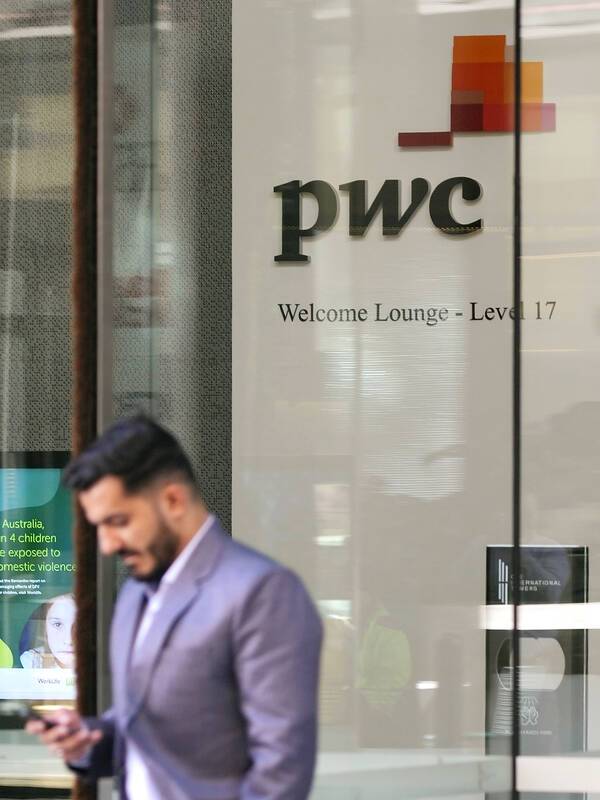PricewaterhouseCoopers (PwC) Australia is putting nine senior partners on leave and appointing independent directors to its board as the embattled firm seeks to claw back confidence in the wake of a tax scandal.
The company plans to ring-fence business conducted with Australia’s government to minimize conflicts of interest and boost governance, it said in a statement yesterday.
The chairs of its governance board and its designated risk committee also stepped down from their respective roles.

Photo: AP
“We are announcing these actions today, despite the fact that our investigation continues, because we recognize that our stakeholders want more transparency in order to restore confidence in our firm,” PwC Australia acting CEO Kristin Stubbins said.
PwC has been under fire following revelations that one of its former tax chiefs obtained secret information during his time working as an adviser to the government, and then leaked it to his colleagues who used it to shop tax-planning advice to global customers.
“We recognize that enhanced governance, structures and controls are necessary, and the decision to ring-fence our Federal government business is a critical next step,” Stubbins said.
Earlier this month, Ziggy Switkowski, a former telecommunications executive, was appointed to lead an independent review into the firm’s governance and culture.
Stubbins said the full report and its recommendations would be published when the review concludes in September.
PwC did not name the partners being put on leave.
Then-PwC Australia CEO Tom Seymour and two other executives stepped down earlier this year after e-mails dating from 2014 to 2017 were made public following demands from the Australian parliament, albeit with names redacted.
The nation’s police force last week opened an investigation into the matter.
Australian Prime Minister Anthony Albanese was yesterday asked whether the names of all PwC partners who had access to confidential tax information should be publicly released.
“All of this should become public at the appropriate time. Of course, there are investigations under way and I don’t want to say anything to interfere with those processes, but quite clearly what went on there is completely unacceptable,” Albanese said on 2SM radio.
In a separate letter, Stubbins yesterday apologized on behalf of her firm for “betraying the trust placed in us.”
“I have worked at PwC for my whole career, and this has been personally and professionally devastating for me and my colleagues at PwC,” she said.

Semiconductor business between Taiwan and the US is a “win-win” model for both sides given the high level of complementarity, the government said yesterday responding to tariff threats from US President Donald Trump. Home to the world’s largest contract chipmaker, Taiwan Semiconductor Manufacturing Co (TSMC, 台積電), Taiwan is a key link in the global technology supply chain for companies such as Apple Inc and Nvidia Corp. Trump said on Monday he plans to impose tariffs on imported chips, pharmaceuticals and steel in an effort to get the producers to make them in the US. “Taiwan and the US semiconductor and other technology industries

SMALL AND EFFICIENT: The Chinese AI app’s initial success has spurred worries in the US that its tech giants’ massive AI spending needs re-evaluation, a market strategist said Chinese artificial intelligence (AI) start-up DeepSeek’s (深度求索) eponymous AI assistant rocketed to the top of Apple Inc’s iPhone download charts, stirring doubts in Silicon Valley about the strength of the US’ technological dominance. The app’s underlying AI model is widely seen as competitive with OpenAI and Meta Platforms Inc’s latest. Its claim that it cost much less to train and develop triggered share moves across Asia’s supply chain. Chinese tech firms linked to DeepSeek, such as Iflytek Co (科大訊飛), surged yesterday, while chipmaking tool makers like Advantest Corp slumped on the potential threat to demand for Nvidia Corp’s AI accelerators. US stock

The US Federal Reserve is expected to announce a pause in rate cuts on Wednesday, as policymakers look to continue tackling inflation under close and vocal scrutiny from US President Donald Trump. The Fed cut its key lending rate by a full percentage point in the final four months of last year and indicated it would move more cautiously going forward amid an uptick in inflation away from its long-term target of 2 percent. “I think they will do nothing, and I think they should do nothing,” Federal Reserve Bank of St Louis former president Jim Bullard said. “I think the

SUBSIDIES: The nominee for commerce secretary indicated the Trump administration wants to put its stamp on the plan, but not unravel it entirely US President Donald Trump’s pick to lead the agency in charge of a US$52 billion semiconductor subsidy program declined to give it unqualified support, raising questions about the disbursement of funds to companies like Intel Corp and Taiwan Semiconductor Manufacturing Co (台積電). “I can’t say that I can honor something I haven’t read,” Howard Lutnick, Trump’s nominee for commerce secretary, said of the binding CHIPS and Science Act awards in a confirmation hearing on Wednesday. “To the extent monies have been disbursed, I would commit to rigorously enforcing documents that have been signed by those companies to make sure we get